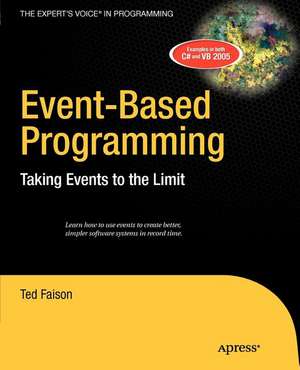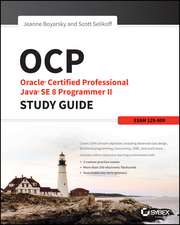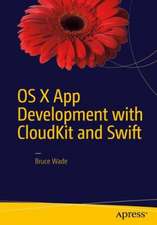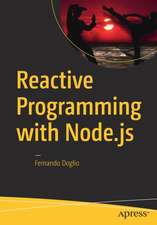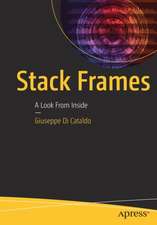Event-Based Programming: Taking Events to the Limit
Autor Ted Faisonen Limba Engleză Paperback – 23 dec 2011
Component-based development (CBD) is an extension of object-oriented programming. CBD does away with the language and vendor-specific limitations of OOP, makes software reuse more practical and accelerates the development process. Event-based programming is the next logical step in CBD, and makes components more reusable due to their decoupled nature. But event-based systems are easier to develop, which means they're cheaper and more reliable than traditional OOP or CBD systems.
This book teaches you how to develop software based on parts that interact primarily through an event mechanism. You'll learn howto use events in many different situations, to solve recurring development problems without coupling. The book introduces Signal Wiring Diagram, a novel form of software diagram similar to the circuit diagrams used by hardware designers. The book concludes with a series of case studies, incorporating all featured concepts. In a nutshell, you'll want to pick up a copy of this book because it:
- Shows how to use an event-based paradigm to reduce or completely eliminate coupling between classes and components
- Describes components, including coordinators, workers, builders, binders, and routers
- Contains three complete case studies that model concepts being used to design small, medium, and large systems
| Toate formatele și edițiile | Preț | Express |
|---|---|---|
| Paperback (2) | 361.26 lei 17-24 zile | +31.51 lei 7-13 zile |
| Apress – 23 dec 2011 | 361.26 lei 17-24 zile | +31.51 lei 7-13 zile |
| Apress – 16 noi 2014 | 559.31 lei 6-8 săpt. | |
| Hardback (1) | 366.71 lei 6-8 săpt. | |
| Apress – mai 2006 | 366.71 lei 6-8 săpt. |
Preț: 361.26 lei
Preț vechi: 451.58 lei
-20% Nou
Puncte Express: 542
Preț estimativ în valută:
69.13€ • 72.17$ • 57.21£
69.13€ • 72.17$ • 57.21£
Carte disponibilă
Livrare economică 10-17 martie
Livrare express 28 februarie-06 martie pentru 41.50 lei
Preluare comenzi: 021 569.72.76
Specificații
ISBN-13: 9781430243267
ISBN-10: 1430243260
Pagini: 696
Ilustrații: XXII, 692 p.
Dimensiuni: 191 x 235 x 37 mm
Greutate: 1.18 kg
Ediția:1st ed.
Editura: Apress
Colecția Apress
Locul publicării:Berkeley, CA, United States
ISBN-10: 1430243260
Pagini: 696
Ilustrații: XXII, 692 p.
Dimensiuni: 191 x 235 x 37 mm
Greutate: 1.18 kg
Ediția:1st ed.
Editura: Apress
Colecția Apress
Locul publicării:Berkeley, CA, United States
Public țintă
Popular/generalNotă biografică
Ted Faison has over 25 years of experience in the software industry and has been involved with object-oriented-programming and component-based development since the inception of those technologies. He has worked primarily in the private sector, also as a consultant for the U.S. and Italian governments. He is a member of IEEE and ACM, and an active researcher in the field of software engineering, specializing in component-based software. He is a senior software engineer at the Southern California Auto Club, where he works on the development of a large .NET distributed system for customer relationship management. Ted is the author of Component-Based Development with Visual C#, Borland C++ Object-Oriented Programming, and Graphical User Interfaces with TurboC++.
Cuprins
Coupling.- Events and Notifications.- Notification Delivery.- Notification Payloads.- A Survey of Commercial Systems.- Diagrams for Event-Based Systems.- Signal Wiring Diagrams.- The Mechanics of Event Firing.- Event-Based Interaction Patterns.- Functional Roles.- Case Study 1: A System Browser.- Case Study 2: A Pipelined HTTP Service.- Case Study 3: A Distributed Workflow System.
Caracteristici
Shows how to use an event-based paradigm to reduce or completely eliminate coupling between classes and components Describes component, including coordinators, workers, builders, binders and routers Contains three complete case studies, showing how the various concepts introduced throughout the book can be leveraged to design small, medium and large systems Source code is provided in both C# and VB.NET
